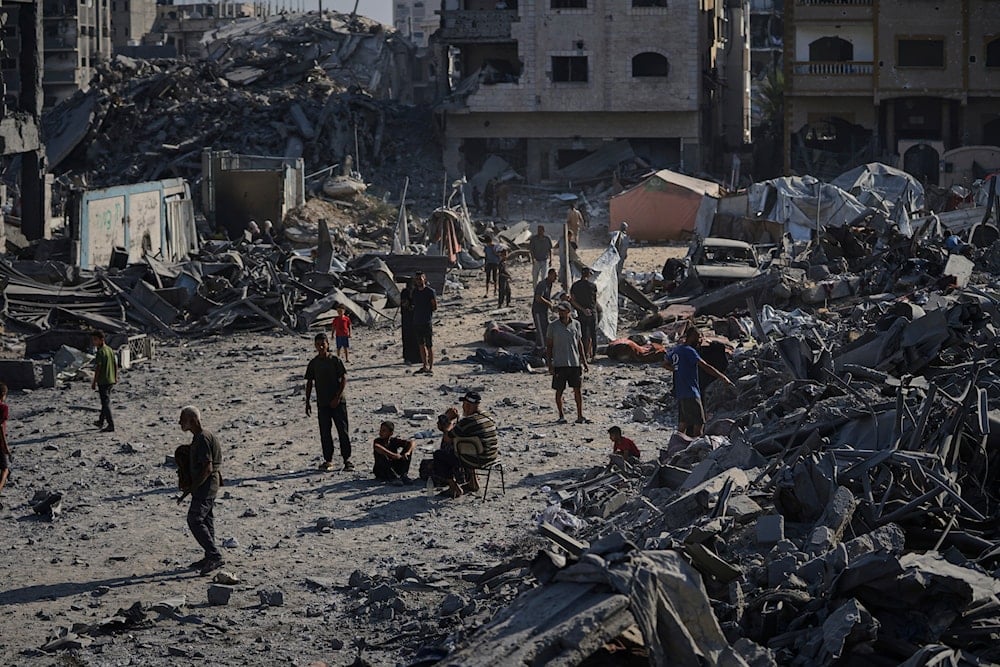UNRWA details Gaza's two years under war, famine, and displacement
UNRWA reports that two years of relentless Israeli attacks have devastated Gaza, leaving tens of thousands dead, infrastructure in ruins, and millions struggling under a suffocating blockade.
-

Palestinians inspect the damage at the Sheikh Radwan al-Taba UNRWA clinic following an Israeli bombardment in Gaza City, Wednesday, Aug. 6, 2025 (AP)
Two years of genocide in Gaza have left the territory shattered, with more than 66,100 people killed, including at least 18,430 children, and nearly all residents forcibly displaced, often multiple times, according to the United Nations Relief and Works Agency (UNRWA).
The agency’s latest report paints a grim picture of a population trapped amid famine, disease, and the collapse of critical infrastructure.
The harrowing Israeli war on the Strip has damaged or destroyed nearly 80 percent of Gaza’s buildings. UNRWA facilities, which have served as shelters for tens of thousands of forcibly displaced people, have also been heavily impacted.
At least 845 people seeking refuge in UNRWA facilities were killed, while more than 370 UNRWA staff lost their lives. At the height of the war, up to one million people sought shelter in the agency’s facilities.
#Gaza’s war: 2 years too long.
— UNRWA (@UNRWA) October 5, 2025
🔴 Nearly 90% of water, sanitation, and hygiene resources destroyed or damaged
🔴 Over 60% of families lack access to soap
🔴 Over 40% live near uncollected waste
🔴 Half a million women and girls lack sufficient menstrual hygiene materials… pic.twitter.com/UG6kSuYtb9
Gaza’s healthcare system is on the brink of collapse. Fewer than 40 percent of hospitals remain functional, only partially, and only four of 22 UNRWA health centers are operational as of October 2025. Medical services have been severely restricted, with over 790 attacks reported on health workers, patients, and facilities.
During the war, UNRWA provided over 10 million primary healthcare consultations and maintained routine immunizations for more than 300,000 children. However, infectious diseases, including respiratory infections, acute watery diarrhea, scabies, suspected meningitis, tuberculosis, and rare cases of Guillain-Barré syndrome, have surged across the Strip.
Famine and food insecurity
The agency has confirmed famine in the Gaza governorate, with conditions projected to worsen in Deir el-Balah and Khan Younis. UNRWA ran out of food supplies by April 2025, and Israeli authorities have blocked the entry of humanitarian aid, including food, since 2 March 2025.
More than 98 percent of Gaza’s cropland has been damaged or rendered inaccessible, and 455 famine-related deaths, including over 150 children, have been recorded. During a temporary ceasefire, over two million people received emergency food assistance.
Since January 2024, nearly 90 percent of water, sanitation, and hygiene (WASH) infrastructure has been damaged or destroyed. Around 500,000 women and girls lack sufficient menstrual hygiene supplies, 60 percent of households have no access to soap, and over 40 percent live near uncollected waste.
Impact on education
Education has been disrupted for nearly 660,000 children for a third consecutive year, with about half enrolled in UNRWA schools. Approximately 92 percent of school buildings require full reconstruction or major rehabilitation.
UNRWA has sought to maintain learning through distance education initiatives reaching over 290,000 children and through activities in shelters benefiting more than 59,000 children. Psychosocial support programs have reached over half a million children affected by the war.
Despite the immense challenges, UNRWA continues to deliver essential services under extreme conditions. The agency has screened over 277,000 children under five for malnutrition, provided vaccinations, facilitated healthcare consultations, distributed emergency food and hygiene supplies, and offered psychosocial support to vulnerable groups.
However, continued restrictions on humanitarian access and persistent Israeli attacks on health and education facilities severely impede the agency’s operations.
UNRWA officials warn that without the immediate lifting of the blockade and increased international support, Gaza’s humanitarian catastrophe will only deepen, particularly for children, the elderly, and other vulnerable populations.

 3 Min Read
3 Min Read










